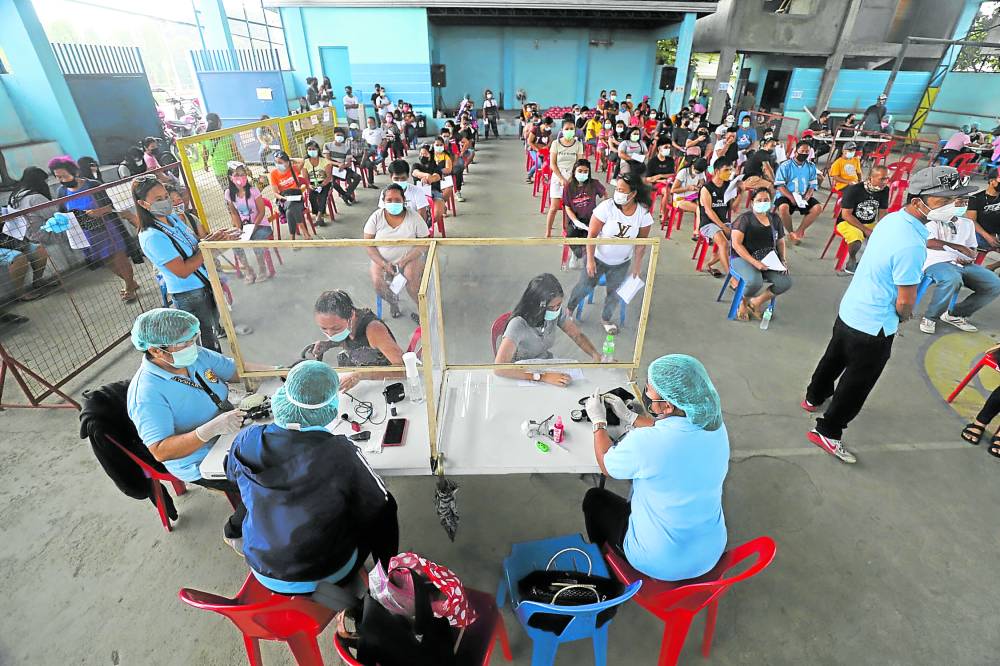
PROTECTING ILONGGOS In this photo taken in September last year, Ilonggos wait for their turn to be inoculated during the Iloilo City government’s vaccination rollout at Barangay Quintin Salas in Jaro district. —PHOTO COURTESY OF ILOILO CITY MAYOR’S OFFICE
Provinces and cities in the Visayas continue to experience a surge in COVID-19 cases, with several hospitals reporting a decrease in manpower as health workers contract the coronavirus.
The Department of Health (DOH) said Western Visayas region on Wednesday recorded its highest number of cases in one day since the pandemic was declared two years ago.
The DOH regional office recorded 1,834 new cases, bringing the cumulative total to 165,094 cases. The new cases pushed the number of active cases to 17,893 with nine new deaths. A total of 4,772 residents in the region died due to complications from the disease.
Iloilo City reported the most number of new cases at 726, followed by Iloilo province (352), Negros Occidental (205), Bacolod City (178), Capiz (146), Antique (118), Aklan (98) and Guimaras (11).
The average number of daily cases in the region soared to 725 as of Jan. 26 from only 26 in December.
Critical risk
The DOH classified the region as “critical risk” as well as the provinces of Aklan, Antique, Capiz and Iloilo, and the cities of Bacolod and Iloilo.
Guimaras and Negros Occidental are classified as “high risk” for COVID-19 transmission.
The DOH also reported that the region’s health system capacity had been elevated to moderate risk from low risk last week based on usage of COVID-19 hospital beds and equipment.
St. Paul’s Hospital of Iloilo Inc. on Wednesday announced that it was indefinitely closing its emergency room after a number of its staff were infected with COVID-19.
The Iloilo City government plans to put up a drive-thru vaccination site in one of the shopping malls in the city.
Local governments in the region have imposed stringent measures on unvaccinated residents, including restriction on their movement and access to certain services.
These policies, however, prompted several groups, who are pushing for mandatory vaccination, to protest, saying the measures constituted a violation of individual rights
Filling void
In Central Visayas, Metro Cebu is in need of health-care workers after at least 316 medical front-liners tested positive for COVID-19 in the last two weeks.
At least 75 of those infected were staff members, including nurses and doctors, of a private hospital in Cebu City, data from the city’s public information office showed.
At least 28 other medical front-liners in two other hospitals in the city were also isolated after they contracted the virus.
The Emergency Operations Center (EOC) declined to give a profile of the rest of the 213 infected health workers but assured that most of them were either asymptomatic or had mild symptoms.
But since they needed to be isolated, the operation of the local health-care system had been disrupted, said Councilor Joel Garganera, the city’s EOC deputy chief implementer.
Mayor Michael Rama said he already asked the DOH in Central Visayas and the Office of the Presidential Assistant for the Visayas (Opav) to hire more doctors, nurses and other medical staff members to augment the hospital workforce in the city.
Rama said the Opav had promised to take care of finding health workers, especially those not currently affiliated with medical institutions, to fill the void.
The DOH earlier said it had shortened the isolation period of health-care workers to only five days so they could report back to work.
Dr. Mary Jean Loreche, DOH regional chief pathologist, said the isolation period could be extended to seven days if the health-care worker would exhibit symptoms and had other medical conditions.
Loreche, however, said some local governments did not follow the updated guidelines for the isolation of health-care workers, as some had been asked to undergo 10 to 14 days of isolation.
Garganera appealed to the public to always observe the health protocols to stop the spread of the virus.
“We have to be very careful. We have to wear our face mask correctly and always clean our hands, avoid social gatherings and be vaccinated,” he said.